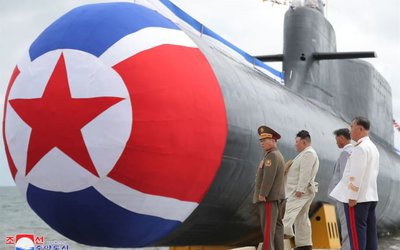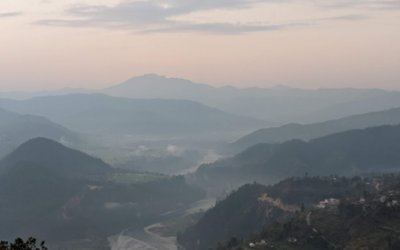The post-Cold War period has seen the rising trend of military diplomacy. High-level military officials' visits, training of personnel in each other's military academies and joint military exercises to strengthen mutual trust and understanding among countries are becoming increasingly common.
In the same vein, given the centrality of "trust deficit" refrain in Sino-Indian discourse, the visit of China's Defense Minister General Liang Guanglie to India is primarily one of goodwill to rejuvenate China-India military-to-military interactions and help evolve better understanding of each other's strategic intentions and initiatives.
Most of the media commentaries, especially those from the West, however, have sought to sensationalize Liang's visit to India by highlighting that it is the first such visit in eight years. They project the visit as one aimed at resolving Sino-Indian differences and speculate on the potential of the two countries' militaries coming together to redefine regional security in the Asia-Pacific region.
Liang's visit to India undoubtedly represents a high-point in China's military diplomacy, but it is only part of the two countries' piecemeal rebuilding of military-to-military contacts over the past two years. More importantly, it had been planned with very specific objectives, which it has managed to achieve. To be precise, the two defense ministers agreed to encourage more high-level military and official exchanges, strengthen their regular military exercises, evolve joint naval understanding on their anti-piracy patrols in the Gulf of Aden and off the coast of Somalia, revive their joint naval search and rescue exercises, encourage regular mutual port calls by their ships and arrange for their officers' training in each other's military academies.
The two sides also agreed to revive their military exercises "at the earliest", which is expected to be early next year. That is also when India's Defense Minister A.K. Antony is expected to undertake his reciprocal visit to Beijing.
Starting from their initial discussions in 2003, the two sides had already conducted two joint naval and two counter-terrorism exercises, and were even discussing joint air force exercises before their 2009 annual defense dialogue and 2010 counter-terrorism exercise was called off. This brief gap in their interaction attributed to specific issues, has also been juxtaposed with the signing of Indo-US Civilian Nuclear Cooperation Agreement and thus widely interpreted as signaling the freezing of Sino-Indian ties. But while there were sporadic hiccups - and some of them continue even now - there was never a serious stand-off or complete freeze in their interactions and visits.
For instance, a delegation of senior Indian military officers visited Beijing, Urumqi and Shanghai in June last year followed by the fourth China-India Annual Defense Dialogue in New Delhi in December. It was the third Annual Defense Dialogue that was delayed and ultimately held in Beijing in January 2010, while the second Annual Defense Dialogue was held in January 2008.
This was followed by Chinese and Indian high-level military delegations exchanging visits in December 2011 and June this year. Zhenghe, China's famous naval ship, visited Kochi on a four-day goodwill trip in May this year to commemorate Chinese explorer and diplomat Zheng He's visit to the city in South India in the early 15th century. So it betrays motives to sensationalize occasional delays and hiccups in Sino-Indian interactions, which are neither threatening to derail their relations nor abnormal to any bilateral ties.
Liang's visit to India is also being projected as part of China's overdrive in military diplomacy with neighboring countries, especially those with which Beijing has territorial or maritime disputes. This again seems extraneous to the timing of Sino-Indian initiatives to build trust and understanding between their two militaries.
If anything, it is the larger issues of maritime piracy, transnational crime and the shifting of the United States' military focus from continental Asia (Iraq and Afghanistan) to the Asia-Pacific region that might have inspired New Delhi and Beijing to expedite their mutual consultations on issues of regional security.
Frankly speaking, no one in China or India was expecting Liang's visit to have regional implications or achieve any political breakthrough as nothing "new" had been planned for his visit other than successfully reviving Sino-Indian military-to-military interactions, which was halted for two years. And this limited objective has certainly been achieved.
India shares a growing strong economic relationship with China, but their military interactions remain confined to ensuring peace and tranquility on their disputed border, in contrast to India's close defense cooperation with the US. This, however, leaves New Delhi and Beijing with a lot more to achieve.
However, thanks to the Western media's commentaries insinuating larger and ulterior motives to Liang's visit to India, a certain air of enthusiasm has surely engulfed the equations between New Delhi and Beijing.
Perhaps global interest in this limited rapprochement between Chinese and Indian militaries highlights how the world views Sino-Indian interactions to be pregnant with the potential of unleashing systematic changes.
The author is a professor of international studies at Jawaharlal Nehru University, New Delhi
- TANAHU HYDROPOWER PROEJCT: A Significant Achievement
- Apr 15, 2024
- AMBASSADOR HANAN GODAR: Sharing Pain With A Nepali Family
- Mar 30, 2024
- VISIT OF KfW AND EIB TO NEPAL : Mission Matters
- Mar 25, 2024
- NEPAL BRITAIN SOCIETY: Pratima Pande's Leadership
- Mar 24, 2024
- NEPAL ARMY DAY: Time To Recall Glory
- Mar 15, 2024
















